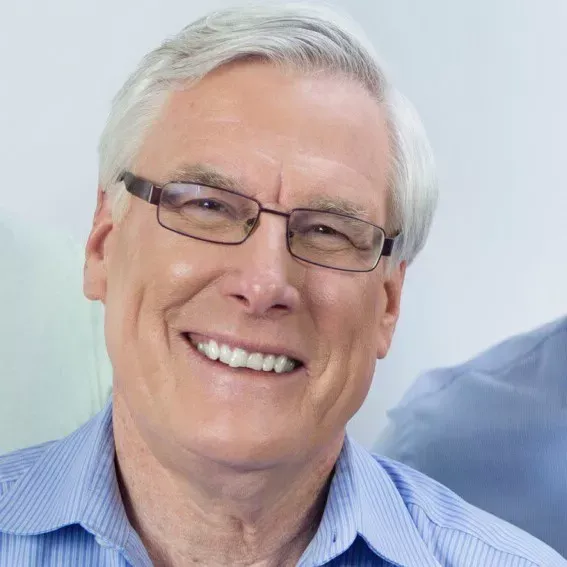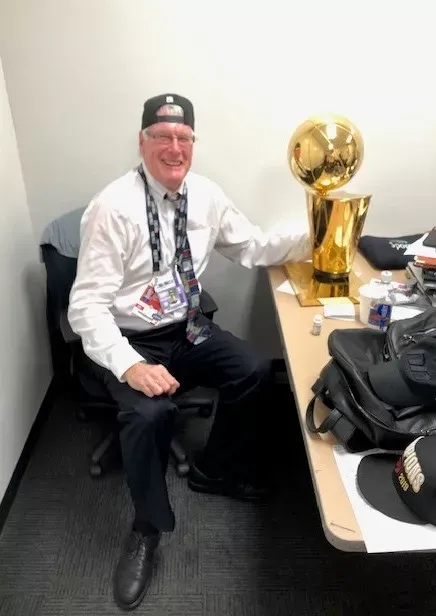September 30, 2024 | Alumni
Championing mental health: A Q&A with Dr. Brian Shaw
By Tara Clemens

Photo by David Lewis.
Dr. Brian Shaw (BSc 1970 UTM) is a prominent figure in the field of psychology and is particularly well-known for his contributions to mental health and addiction treatment. Dr. Shaw is an originator of applied Cognitive-Behavioural Psychology, a form of therapy that helps individuals identify, question and modify their thought processes and which is among the most widely recognized therapy practices today. An author of the authoritative guide Cognitive Theory of Depression, Dr. Shaw has advanced our understanding of cognitive factors in depressive and anxiety disorders.
In addition to his work in clinical psychology, Dr. Shaw has made important contributions to sports psychology, working with teams like the Toronto Raptors and Blue Jays, as well as various Olympic athletes. He played a key role in providing mental health support to professional players in the National Hockey League and Major League Soccer.
Currently Dr. Shaw is the chief executive officer of Continicare, a company focused on digital therapeutics. Under his leadership Continicare has developed an innovative app that provides mental health assessments and cognitive-behaviour therapy interventions in collaboration with the individual's therapist.
UTM had the pleasure of sitting down with Dr. Shaw to discuss his impactful work, to reminisce about his time at U of T and to gain insight into the future of mental health treatment.
Can you share a little about what made your time at UTM, formerly Erindale, so memorable?
You’d have to start with Margaret, my wife of 53 years. We started dating in second year. Marg graduated in 1970, I stayed on in 1971 trying to get into graduate school. That's a definite fond memory. My other memory is of the quality of the education. Professor Lester Krames, Professor Mike Spiegel and Professor Tuzo J. Wilson – they had an enormous impact on me. The ability to have a close connection with influential academics was incredible. It was like a small village. You didn't get a big, impersonal university feel; it was a real community.

Which accomplishments stand out as your most significant and impactful?
Well, first and foremost, my now adult children, Steve and Marnie.
Developing Cognitive-Behaviour Therapy, definitely. It is still the best scientifically supported psychotherapy. I was the behavioural engineer who wrote the detailed therapy procedures and interventions that led to the scientific studies.
As a clinical psychologist, I hear from clients and families, sometimes years later. While we do have tragic losses dealing with suicide and drug addiction, I also get to hear stories of resilience and recovery.
On the athletic side, nothing beats winning a championship with the Raptors! I will also always treasure the privilege I was given to serve the players of the National Hockey League and Major League Soccer and their families.
As one of the originators of Cognitive-Behavioural Therapy (CBT), what would you say has changed most with regards to people's acceptance of mental health treatment from the beginning of your career to now?
There have been some enormous shifts towards the acceptance and understanding of mental health disorders and the suffering that people endure. Psychologists refer to the brain-behaviour connection. While our knowledge is still in the very early stages, we recognize that, in fact, it is challenging to manage many of the stresses, threats and losses in life.
Back when I started my career, there were many judgments about “weakness of character” and a “lack of a backbone.” The whole mindset was basically one of blaming the victim. Now there’s a much broader understanding of how earlier traumas, the environment of family life and the transitions that people go through have both brain and behavioural effects. We see children who have experienced trauma or neglect and have a greater understanding of the impact that has on them. We see survivors and understand that they should not be blamed, but cared for and supported. I would say that is the biggest attitudinal change I have seen.

What aspects of working with athletes have you enjoyed the most? What are some unique challenges?
Helping athletes was originally a bit of a relief valve in my practice. I started out working with people who suffered from depression, suicide risk, substance abuse and anxiety. It was very challenging and stressful. Working with athletes gave me a window into performance of a very different type. The pleasure has been seeing the athletes really grow and understand how their professional life – which is extremely competitive and as intense as you’d expect – could be improved when they look after their mental life. I’m much more of a support system for people who have their own talents and abilities and get to express them. And it’s not just athletes, it's also authors, musicians and others who are trying to achieve in highly competitive environments.
Let’s talk about Franky – a new app that you have been instrumental in developing that provides effective and personalized mental health support in collaboration with the user’s own therapist. What was the inspiration for Franky, and how do you envision its impact?
When we initially created CBT, we lacked the technological tools available today. Now we are entering the second stage of engineering CBT aimed at addressing the shortage of mental health clinicians and providing clients with daily support between therapy sessions.
Our first step was to develop a self-service behavioural health assessment and triage system that we called the “Franky” application. This system provides a comprehensive evaluation of an individual's mental well-being, including signs and symptoms of mental health disorders, cognitive abilities, strengths, coping strategies and personality characteristics.
Based on a triage report, individuals will receive personalized "psychoeducation" and digital Cognitive-Behaviour Therapy (eCBT) for immediate and ongoing support. Clients are also matched with mental health professionals. This assessment ensures timely access to support exactly when and where it is needed, providing continuity of care. Hence the inspiration behind the name Continicare.
What piece of advice would you love to share with others?
Keep it simple – work on daily kindness and empathy. Remember that the perspective you have on who you are, your world and your future will expand as you recognize the biases in your thinking and attitudes and the resulting self-defeating habits and behaviours.
We live in a vast universe within universes. The search for new experiences and knowledge is almost always rewarding.

